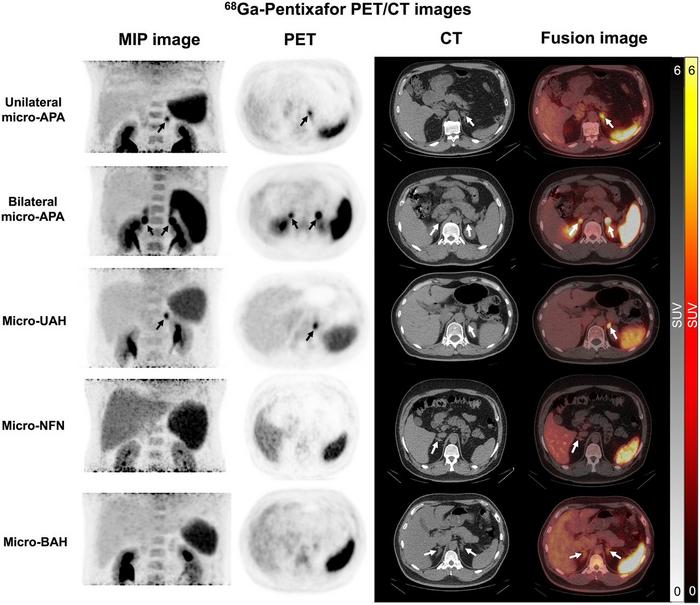Reston, VA—A novel imaging approach, 68Ga-pentixafor PET/CT, has been shown to accurately identify sub-types of primary aldosteronism (an adrenal gland disorder), outperforming traditional methods for diagnosis. Reported in the January issue of The Journal of Nuclear Medicine, this detailed imaging technique provides a clearer picture of the adrenal glands, helping doctors decide more confidently whether surgery is the right option for patients.

Credit: Images created by Jie Ding and Li Huo, et al., Peking Union Medical College Hospital, Beijing, China.
Reston, VA—A novel imaging approach, 68Ga-pentixafor PET/CT, has been shown to accurately identify sub-types of primary aldosteronism (an adrenal gland disorder), outperforming traditional methods for diagnosis. Reported in the January issue of The Journal of Nuclear Medicine, this detailed imaging technique provides a clearer picture of the adrenal glands, helping doctors decide more confidently whether surgery is the right option for patients.
Primary aldosteronism is an endocrine disorder that occurs when the adrenal glands produce too much of the hormone aldosterone, frequently caused by the presence of nodules on the glands. High aldosterone levels cause the body to retain too much sodium and not enough potassium. This imbalance can lead to high blood pressure, putting patients at an increased risk of stroke and heart disease.
“In primary aldosteronism, it’s important for physicians to differentiate between surgically eligible and ineligible forms so that they can develop the best treatment plan. This is usually done with adrenal CT and adrenal venous sampling. However, is rather challenging and often imprecise to diagnose adrenal micronodules with these methods,” said Li Huo, MD, PhD, professor and chair in the Department of Nuclear Medicine at the Chinese Academy of Medical Sciences and Peking Union Medical College Hospital in Beijing, China. “To more clearly image these micronodules, we combined PET/CT with a unique tracer that targets specific receptors in the adrenal glands and evaluated its performance.”
In the study, 123 patients with adrenal micronodules identified by adrenal CT were examined using 68Ga-pentixafor PET/CT, and 104 patients who underwent surgery or successful adrenal venous sampling were included in the analysis. Nuclear medicine physicians evaluated the 68Ga-pentixafor PET/CT data for sensitivity, specificity and accuracy of visual analysis. This information was then compared to adrenal CT and adrenal venous sampling results.
68Ga-pentixafor PET/CT showed superior sensitivity, specificity and accuracy (90.2 percent, 72.7 percent and 86.5 percent, respectively) in identifying surgically eligible primary aldosteronism patients compared with adrenal CT (73.1 percent, 53.8 percent and 68.3 percent, respectively). It was also able to predict surgical outcomes better than adrenal venous sampling (82.4 percent vs. 68.86 percent).
“The significance of this work lies in its potential to change how we diagnose and treat primary aldosteronism patients with tiny adrenal nodules. For patients, this means an improved chance of getting the right treatment, especially when it comes to deciding whether surgery is necessary. Accurate diagnosis is crucial because it leads to more effective treatments, less unnecessary surgery and overall better health outcomes. It’s about offering patients a more personalized and precise medical approach,” stated Huo.
This research was published online in November 2023.
The authors of “Clinical Value of 68Ga-Pentixafor PET/CT in Subtype Diagnosis of Primary Aldosteronism Patients with Adrenal Micronodules” include Jie Ding and Li Huo, Department of Nuclear Medicine, Beijing Key Laboratory of Molecular Targeted Diagnosis and Therapy in Nuclear Medicine and State Key Laboratory of Complex Severe and Rare Diseases, Peking Union Medical College Hospital, Chinese Academy of Medical Science and Peking Union Medical College, Beijing, China; Xiang Li and Marcus Hacker, Division of Nuclear Medicine, Department of Biomedical Imaging and Image-Guided Therapy, Medical University of Vienna, Vienna, Austria; Shengyan Liu, Peking Union Medical College Hospital, Chinese Academy of Medical Science and Peking Union Medical College, Beijing, China; Yinjie Gao and Anli Tong, Department of Endocrinology and Key Laboratory of Endocrinology, Ministry of Health, Peking Union Medical College Hospital, Chinese Academy of Medical Science and Peking Union Medical College, Beijing, China; and Guoyang Zheng and Yushi Zhang, Department of Urological Surgery, Peking Union Medical College Hospital, Chinese Academy of Medical Science and Peking Union Medical College, Beijing, China.
Visit the JNM website for the latest research, and follow our new Twitter and Facebook pages @JournalofNucMed or follow us on LinkedIn.
###
Please visit the SNMMI Media Center for more information about molecular imaging and precision imaging. To schedule an interview with the researchers, please contact Rebecca Maxey at (703) 652-6772 or [email protected].
About JNM and the Society of Nuclear Medicine and Molecular Imaging
The Journal of Nuclear Medicine (JNM) is the world’s leading nuclear medicine, molecular imaging and theranostics journal, accessed more than 16 million times each year by practitioners around the globe, providing them with the information they need to advance this rapidly expanding field. Current and past issues of The Journal of Nuclear Medicine can be found online at http://jnm.snmjournals.org.
JNM is published by the Society of Nuclear Medicine and Molecular Imaging (SNMMI), an international scientific and medical organization dedicated to advancing nuclear medicine and molecular imaging—precision medicine that allows diagnosis and treatment to be tailored to individual patients in order to achieve the best possible outcomes. For more information, visit www.snmmi.org.
Journal
Journal of Nuclear Medicine
DOI
10.2967/jnumed.123.266061
Article Title
Clinical Value of 68Ga-Pentixafor PET/CT in Subtype Diagnosis of Primary Aldosteronism Patients with Adrenal Micronodules
Article Publication Date
1-Jan-2024




